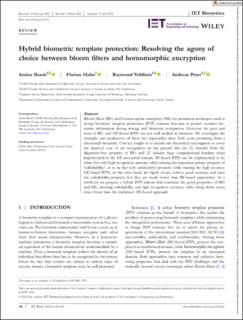| dc.contributor.author | Bassit, Amina | |
| dc.contributor.author | Hahn, Florian | |
| dc.contributor.author | Veldhuis, Raymond Nicolaas Johan | |
| dc.contributor.author | Peter, Andreas | |
| dc.date.accessioned | 2023-02-10T09:05:41Z | |
| dc.date.available | 2023-02-10T09:05:41Z | |
| dc.date.created | 2022-09-15T12:59:50Z | |
| dc.date.issued | 2022 | |
| dc.identifier.citation | IET Biometrics. 2022, 1-15. | en_US |
| dc.identifier.issn | 2047-4938 | |
| dc.identifier.uri | https://hdl.handle.net/11250/3049906 | |
| dc.description.abstract | Bloom filters (BFs) and homomorphic encryption (HE) are prominent techniques used to design biometric template protection (BTP) schemes that aim to protect sensitive biometric information during storage and biometric comparison. However, the pros and cons of BF- and HE-based BTPs are not well studied in literature. We investigate the strengths and weaknesses of these two approaches since both seem promising from a theoretical viewpoint. Our key insight is to extend our theoretical investigation to cover the practical case of iris recognition on the ground that iris (1) benefits from the alignment-free property of BFs and (2) induces huge computational burdens when implemented in the HE-encrypted domain. BF-based BTPs can be implemented to be either fast with high recognition accuracy while missing the important privacy property of ‘unlinkability’, or to be fast with unlinkability-property while missing the high accuracy. HE-based BTPs, on the other hand, are highly secure, achieve good accuracy, and meet the unlinkability-property, but they are much slower than BF-based approaches. As a synthesis, we propose a hybrid BTP scheme that combines the good properties of BFs and HE, ensuring unlinkability and high recognition accuracy, while being about seven times faster than the traditional HE-based approach. | en_US |
| dc.language.iso | eng | en_US |
| dc.publisher | John Wiley & Sons Ltd on behalf of The Institution of Engineering and Technology. | en_US |
| dc.rights | Navngivelse 4.0 Internasjonal | * |
| dc.rights.uri | http://creativecommons.org/licenses/by/4.0/deed.no | * |
| dc.title | Hybrid biometric template protection: Resolving the agony of choice between bloom filters and homomorphic encryption | en_US |
| dc.title.alternative | Hybrid biometric template protection: Resolving the agony of choice between bloom filters and homomorphic encryption | en_US |
| dc.type | Peer reviewed | en_US |
| dc.type | Journal article | en_US |
| dc.description.version | publishedVersion | en_US |
| dc.source.pagenumber | 1-15 | en_US |
| dc.source.volume | 11 | en_US |
| dc.source.journal | IET Biometrics | en_US |
| dc.source.issue | 5 | en_US |
| dc.identifier.doi | 10.1049/bme2.12075 | |
| dc.identifier.cristin | 2052027 | |
| cristin.ispublished | true | |
| cristin.fulltext | original | |
| cristin.qualitycode | 1 | |

